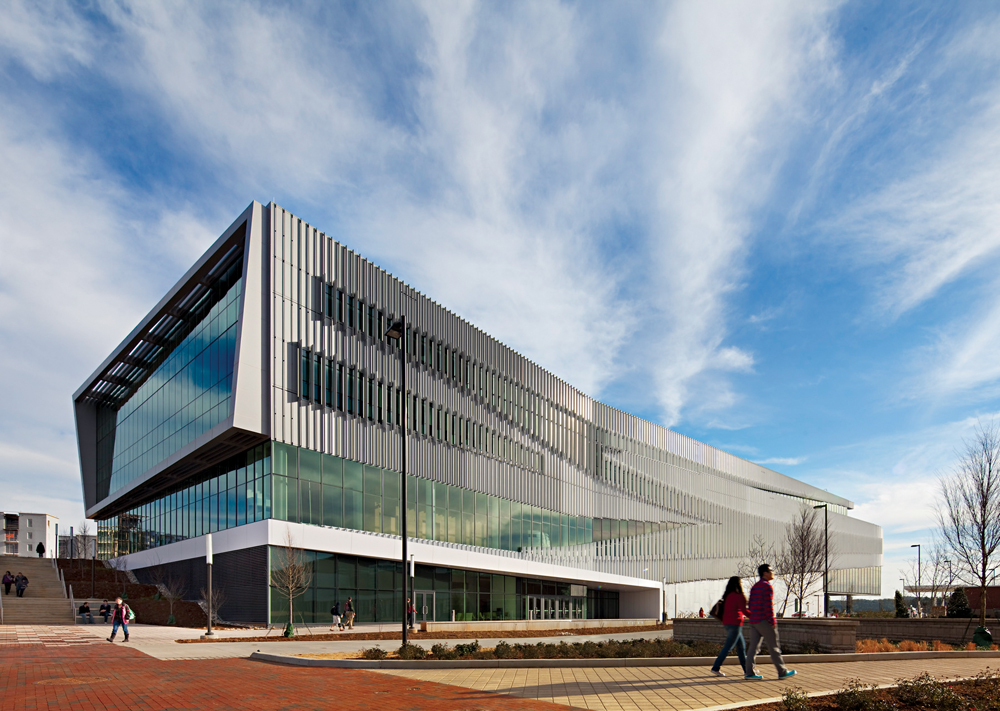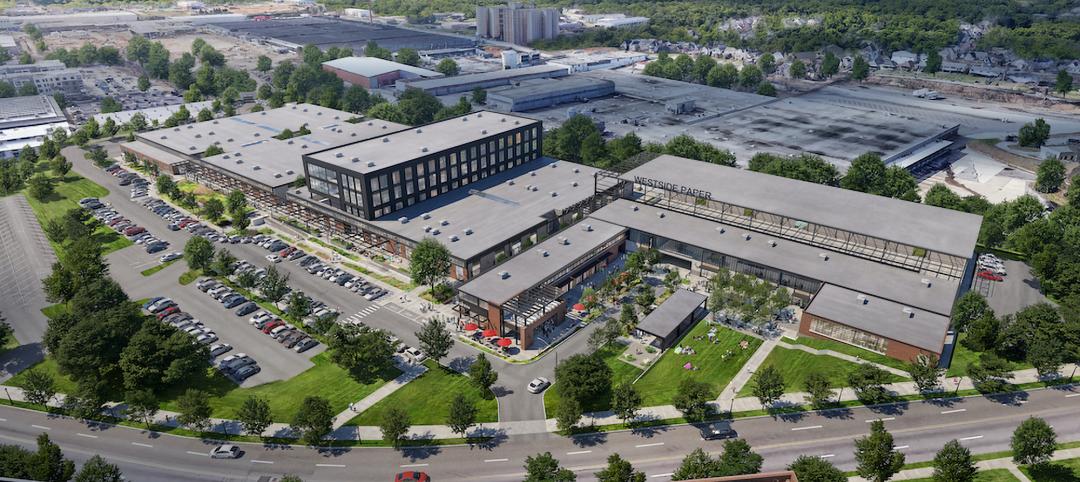Economic recovery has been slow, and the overall higher ed market is still fairly flat, according to a 2013 report by consultant Paul Abramson, using data from Dun and Bradstreet (http://bit.ly/ZiM6cQ).
Nevertheless, better investment performance is improving the mood of donors and easing some of the pressure on endowments. “The market is beginning to open up, with pent-up demand pushing projects to get funded and into design and construction,” says Steve Rhoades, Associate Principal and Client Executive at KJWW Engineering Consultants.
Recruitment pressure has convinced some clients to green-light capital projects. “One of the key drivers of growth is the need for colleges and universities to stay more competitive in amenities: more luxurious dorms, state-of-the-art athletic facilities, technologically advanced classrooms,” says Thomas Goemaat, President and CEO of Shawmut. Goemaat says his firm has seen a “significant and sustained uptick” in academic work in New England and the Tri-State region of New York, New Jersey, and Connecticut.
Large facilities that combine academic and medical objectives are capitalizing on the synergy between education, science, and clinical services. For instance, the University at Buffalo (N.Y.), whose UB2020 master plan has been simmering since 2004, will break ground this fall on its $375 million School of Medicine and Biomedical Sciences Building. At half a million square feet, the HOK-designed facility is the linchpin of UB’s plan to create a whole new Downtown Campus. The city will build a Metro station below the structure, and a children’s hospital (run by the nonprofit Kaleida Health) and privately owned medical office building will rise next door.
TOP UNIVERSITY ARCHITECTURE FIRMS
2012 University Revenue ($)1 Cannon Design $71,000,0002 Perkins+Will $49,726,5433 Stantec $36,704,0774 EYP $30,000,0005 SmithGroupJJR $25,600,0006 Gensler $22,140,0007 IBI Group $21,432,7128 Flad Architects $20,350,0009 Wight & Co. $18,072,20010 Sasaki Associates $16,865,404
TOP UNIVERSITY ENGINEERING FIRMS
2012 University Revenue ($)1 Affiliated Engineers $47,202,0002 URS Corp. $39,211,8523 AECOM Technology Corp. $33,000,0004 Buro Happold Consulting Engineers $28,695,0005 Burns & McDonnell $25,635,0006 STV $21,121,0007 Parsons Brinckerhoff $19,000,0008 Clark Nexsen $18,141,7909 Vanderweil Engineers $15,062,10010 KJWW Engineering Consultants $13,554,873
TOP UNIVERSITY CONSTRUCTION FIRMS
2012 University Revenue ($)1 Whiting-Turner Contracting Co., The $818,113,1402 Turner Corporation, The $701,340,0003 Skanska USA $437,058,2284 Structure Tone $354,907,9005 PCL Construction Enterprises $340,500,0756 Mortenson Construction $246,330,0007 Swinerton Builders $229,439,9508 DPR Construction $227,149,3779 Sundt Construction $225,748,51410 Austin Commercial $225,311,911
The partnership aspects of the UB project illustrate a trend toward creative public/private development. “There is a growing understanding that institutions can no longer afford to function independent of their host community—a change that has been driven in part by growing financial pressures,” says Mike Medici, AIA, Learning Practice Leader at SmithGroupJJR. “This is leading to an increase in community development partnerships as institutions seek to leverage their impact as ‘economic engines.’”
In Camden, N.J., Rowan University is finishing its $139 million Cooper Medical School education building—home of a new med school, the state’s first such project in more than 30 years. The curriculum emphasizes problem-based learning, with academic facilities tailored to group work plus hands-on simulations with robots and even a virtual reality CAVE. The project, designed by HDR, embodies higher ed’s current concern for programs that prepare students for a tough job market.
With thousands of traditional dorms still in use, the need for more modern residences also continues to generate work. Some responses have been dramatic, such as the 21-story Tree House just built by Suffolk Construction at the Massachusetts College of Art and Design, Boston. Amenities of the 493-bed apartment-style facility include a health center, café, and “Pajama Floor” where students can play games, watch TV, study, or work out while doing laundry. Hardin Construction (just acquired by DPR) recently delivered projects comprising nearly 2,000 beds for four academic clients in Georgia—all spurred by a desire to meet “modern consumer expectations,” according to Director of Higher Education Carlos Torres.
In another competitive strategy, some schools are replacing old-style student unions with recreation centers emphasizing wellness. Buildings may include student services offices, clinics, or classrooms for related subjects.
Auburn University at Montgomery (Ala.) positioned its 74,000-sf Wellness Center as a new front door for the entire campus. Constructed by BL Harbert International, the facility includes outdoor fields, two basketball courts, weight and cardio rooms, two multipurpose rooms, an aquatic center with outdoor spa, an indoor track, climbing wall, and juice bar, plus classrooms, lecture halls, and a lab for the Department of Physical Education and Exercise Science.
Finally, the American College & University Presidents’ Climate Commitment, now with 669 signatories, continues to influence construction. Some schools are eyeing net-zero and the Living Building Challenge for a variety of building types. And though central plants may not be glamorous, many clients now recognize the tantalizing ROI offered by improved infrastructure. In an extreme example, Rist-Frost-Shumway engineered a new 15,800-sf wood-biomass heating plant with cogeneration for Colby College in Waterville, Maine—a milestone in the school’s quest for carbon neutrality.
As in other sectors, energy performance of existing buildings is also becoming a high priority for higher ed. “The old piecemeal approach that advocates randomly adding sustainable applications won’t do the trick; more holistic building energy strategies are required,” says Vuk Vujovic, Director of Sustainable Design at Legat Architects.
Read BD+C's full Giants 300 Report
Related Stories
Industry Research | Jan 23, 2024
Leading economists forecast 4% growth in construction spending for nonresidential buildings in 2024
Spending on nonresidential buildings will see a modest 4% increase in 2024, after increasing by more than 20% last year according to The American Institute of Architects’ latest Consensus Construction Forecast. The pace will slow to just over 1% growth in 2025, a marked difference from the strong performance in 2023.
Giants 400 | Jan 23, 2024
Top 110 Medical Office Building Architecture Firms for 2023
SmithGroup, CannonDesign, E4H Environments for Health Architecture, and Perkins Eastman top BD+C's ranking of the nation's largest medical office building architecture and architecture engineering (AE) firms for 2023, as reported in the 2023 Giants 400 Report.
Giants 400 | Jan 22, 2024
Top 100 Outpatient Facility Architecture Firms for 2023
HDR, CannonDesign, Stantec, Perkins&Will, and ZGF top BD+C's ranking of the nation's largest outpatient facility architecture and architecture engineering (AE) firms for 2023, as reported in the 2023 Giants 400 Report. Note: This ranking includes design revenue for work related to outpatient medical buildings, including cancer centers, heart centers, urgent care facilities, and other medical centers.
Construction Costs | Jan 22, 2024
Construction material prices continue to normalize despite ongoing challenges
Gordian’s most recent Quarterly Construction Cost Insights Report for Q4 2023 describes an industry still attempting to recover from the impact of COVID. This was complicated by inflation, weather, and geopolitical factors that resulted in widespread pricing adjustments throughout the construction materials industries.
Transit Facilities | Jan 22, 2024
Top 40 Transit Facility Architecture Firms for 2023
Perkins&Will, HDR, Gensler, Skidmore, Owings & Merrill, and HNTB top BD+C's ranking of the nation's largest transit facility architecture and architecture engineering (AE) firms for 2023, as reported in the 2023 Giants 400 Report. Note: This ranking includes design revenue for work related to bus terminals, rail terminals, and transit stations.
Hotel Facilities | Jan 22, 2024
U.S. hotel construction is booming, with a record-high 5,964 projects in the pipeline
The hotel construction pipeline hit record project counts at Q4, with the addition of 260 projects and 21,287 rooms over last quarter, according to Lodging Econometrics.
Modular Building | Jan 19, 2024
Virginia is first state to adopt ICC/MBI offsite construction standards
Virginia recently became the first state to adopt International Code Council/Modular Building Institute off-site construction standards.
Office Buildings | Jan 19, 2024
How to strengthen office design as employees return to work
Adam James, AIA, Senior Architect, Design Collaborative, shares office design tips for the increasingly dynamic workplace.
Modular Building | Jan 19, 2024
Building with shipping containers not as eco-friendly as it seems
With millions of shipping containers lying empty at ports around the world, it may seem like repurposing them to construct buildings would be a clear environmental winner. The reality of building with shipping containers is complicated, though, and in many cases isn’t a net-positive for the environment, critics charge, according to a report by NPR's Chloe Veltman.
Adaptive Reuse | Jan 18, 2024
Coca-Cola packaging warehouse transformed into mixed-use complex
The 250,000-sf structure is located along a now defunct railroad line that forms the footprint for the city’s multi-phase Beltline pedestrian/bike path that will eventually loop around the city.

















